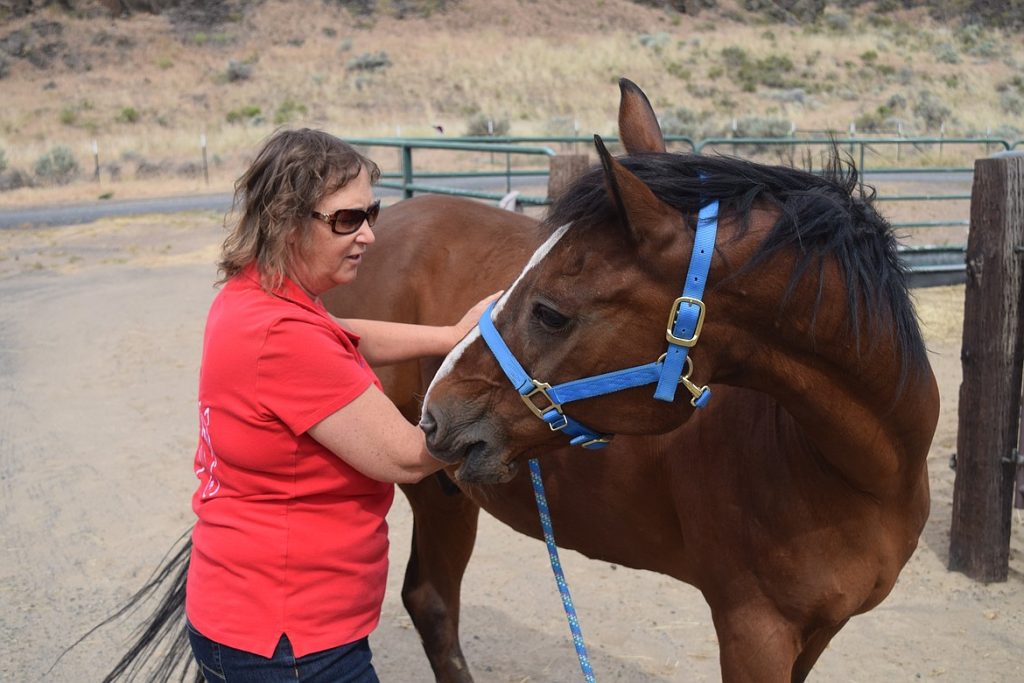 Benefits of equine massage detailed at seminar
Benefits of equine massage detailed at seminar
SOAP LAKE – June 30th 2020
It’s really about learning to read an animal’s “non-verbal cues.”
“Horses can’t speak for themselves when they’re not feeling right,” said Alex Rozga. “They’ll let you know when they’re not feeling right, but they’re not going to tell you what exactly is wrong.”
“They can’t,” Rozga added.
Rozga said she came all the way from Portland, Oregon, to a dusty patch of Grant County along Road 20 between Soap Lake and Stratford Road on Saturday, to the Langley Equine Studio to learn a little of the fine art of horse massage.
According to Mary Lou Langley, owner and operator of the studio, undiagnosed and untreated pain often causes horses to fail to perform or even to misbehave. Over the years, Langley said she has learned how to read a horse’s body language, and then use touch — massage, or “body work” — to relieve muscular stress and pain and help an animal feel better, act better and perform better.
“Lame or not moving correctly under the saddle, there might be behavioral issues that are based in pain,” Langley said. “People come here seeking a remedy for their horse’s pain. That’s what massage does, it releases a horse’s pain, increases circulation and lymphatic flow, and reduces tension and spasms.”
“If you don’t know what’s wrong with a horse, massage is the key,” she added.
Langley started her school — housed in a small prefab building next to her horse barn — because she needed to figure out how to get the best out of her animals.
“I had three kids and nine horses, and I couldn’t afford to have them all adjusted by a chiropractor,” she said. “I had to figure out how to help them all on my own.”
Langley’s studio is a state-accredited vocational school, and Langley herself teaches programs for people who want to become certified horse massage therapists.
In fact, in the state of Washington, horse massagers must complete 300 hours of instruction and pass a national certification exam, according to the Washington Department of Health website. Langley offers those courses, both in person and online, as a way to deal with the large number of poorly trained “illegal therapists” who don’t do much good and can even hurt animals.
She also offers weekend seminars, like the one attended by Rozga and Joanne Hiltwein of Benton City, in which Langley teaches some in-depth anatomy and then gives her students a little practical time massaging their horses.
Langley said the two-day course will not only help them resolve some of the issues their own horses have, but know when to seek a professional massage therapist or even a veterinarian.
“There’s a real need for it,” she said. “My goal is to raise the standard in equine body work, educate the horse owner, and produce legal qualified therapists.”
Hiltwein said she came to the weekend seminar because the people she’d hired were not helping her horse’s knee and hind issues, and she wants to eventually ride her Appaloosa for show.
“I’ve had horses my whole life,” Hiltwein said. “For the last several years, I used chiropractors, and had a lady come do massage, but I was just not getting the results.”
“This is something they need all the time,” Hiltwein added. “Not just when they are coming up lame or short.”
Outside, Langley demonstrates some massage techniques on 32-year-old Slick, who starts to nudge her and stretch his neck as she slowly but firmly works on his back.
He nuzzles her — a sign, she said, that what she is doing is working.
“Muscle is what pulls on bone and causes movement,” Langley said. “Human athletes get massage to perform better. Horses are not different. Anatomy is anatomy.”
Originally published here on June 30th 2020

